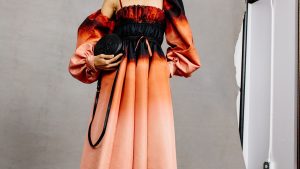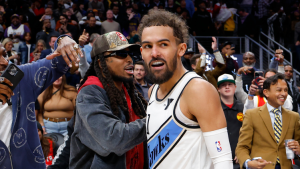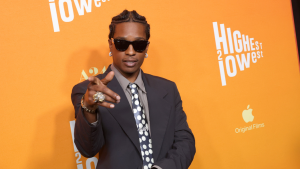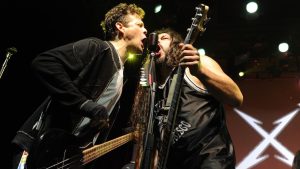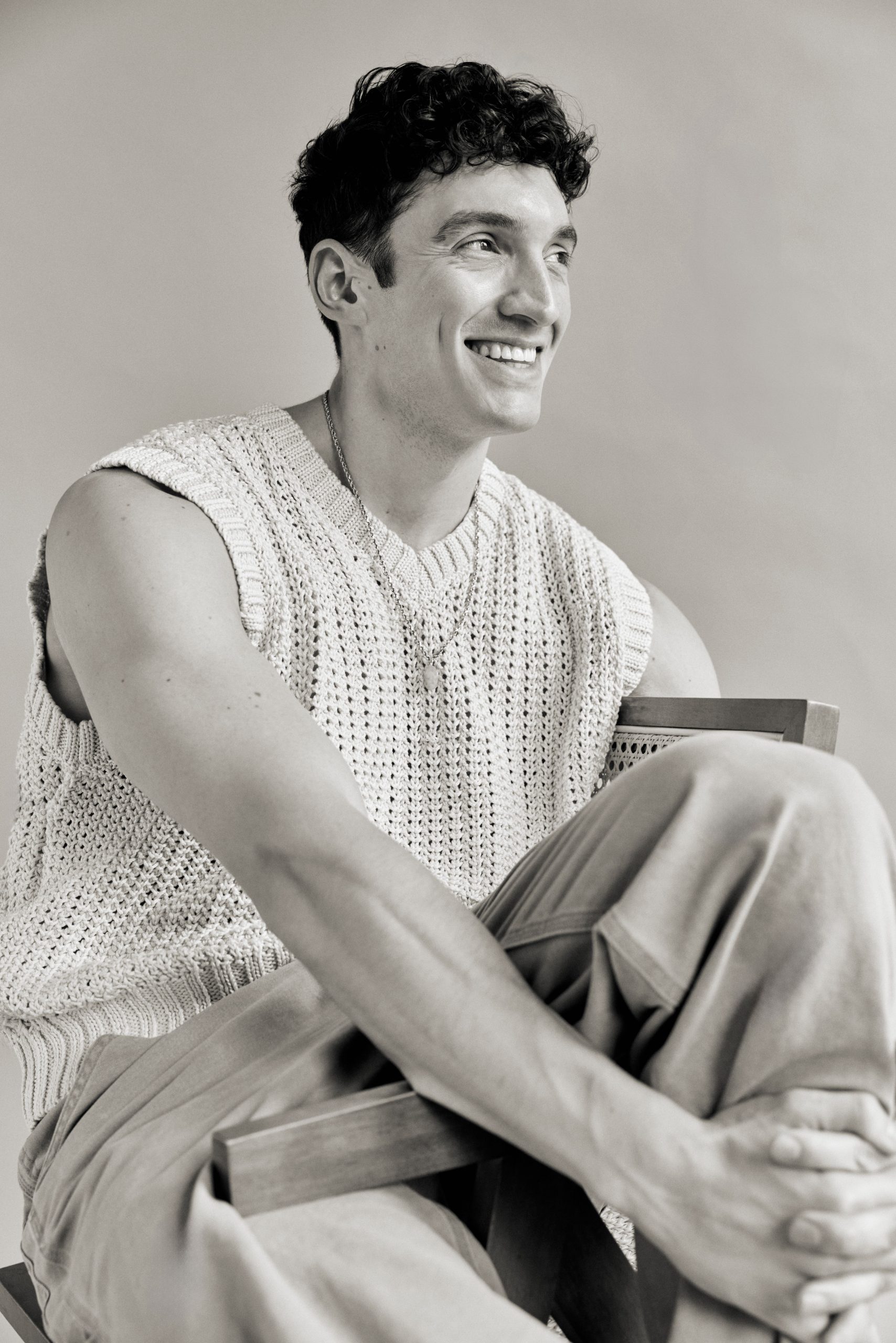
‘Evita’ Star James Olivas on Playing a New-Era Juan Perón, Political Parallels, and Puzzles
It’s a new week at the London Palladium theater, where the Evita cast is collectively shaking off a bug. “We were really limping across the finish line this past week,” says James Olivas, who plays leading man Juan Perón. “We had every swing on and people doing split tracks, which we’ve never done before, just to get the show up and running. Everyone’s incredibly talented, so it worked out.”
To his point, the chaos was not in any way obvious to their audience. Reviews of Jamie Lloyd’s West End revival of Evita, the musical by Andrew Lloyd Webber and Tim Rice that first came to the stage in 1978, have highlighted the cast’s chemistry and kinetic energy. It’s a modern and adrenaline-spiking retelling of Argentina’s most famous first lady’s story—played by Rachel Zegler—with big rock numbers and Beyoncé-esque hair flips, slaloming through populist politics and celebrity worship. Opposite Zegler is Olivas, a stoic, sinister Perón—and, at 28, an unusually young actor for the role.
When we speak, just before call time and warm-ups, Olivas is a beaming, jokey antipode to his character. Diego Andres Rodriguez, who plays Che, waves in the background of our Zoom. (Rodriguez and Olivas share an apartment block in Camden, and a dressing room deep in the Palladium annals.) It’s both of their first times in the UK. “Every day off, we explore as much as we can,” says Olivas. They tried to pitch a trip to Brighton Pride to see headliner Mariah Carey, but couldn’t make it work; instead, they went for a Sunday roast at the Greyhound, walked around Kew Gardens, and had drinks in Richmond on the Thames. All the textbook tourist stuff was ticked off weeks into rehearsals.
Olivas grew up in Houston, Texas, before moving to Los Angeles for school and college. His focus on football, basketball, and water polo—and plans to eventually follow in his father’s footsteps to become a mechanical engineer—shifted after a knee injury, and being exposed to theater in LA. (Constantly hearing him sing in the shower eventually pushed his mom to push him into a community production of Ragtime.) “From then I did as much as I could,” Olivas says. “But I thought it was something I would do on the weekends outside of my reliable, steady, nine-to-five job.” His time in conservative Texas had also left him with “a lot of unlearning to do about what I could be.”
“In college, I stopped and thought, It’s theater or engineering. I took a leap of faith. So here we are, on the West End.”
They’re now well into the run, one that’s enraptured both the Palladium’s sold-out crowds, and any passersby lucky to catch Zegler’s now-very-viral balcony scene. As it plays out on London’s Argyll Street, inside, Olivas sits on the stage’s bleachers, a quiet force.
Here, James Olivas speaks with Vogue about embodying a new, ever more urgent Juan Perón, the show’s political parallels with our current moment, and his penchant for puzzles.
Vogue: Hi, James! How have you settled into your role? It’s a very different kind of Juan Perón than we’ve seen before.
James Olivas: Well, due to the nature of my character, I can’t throw a whole bunch of energy into it—which is something that would be my default. If I’m confused, I try very hard. But this character is antithetical to that; he’s deliberate, emanating an energy of solid, absolute confidence. And I think that as the weeks have gone on, I’ve been able to settle more into this sense of presence.
The big challenge for me was trying to figure out how, in the absence of any monologues and songs, do you still leave an impact on the audience? It’s been a big growing journey for me as an actor, and one that I think has been beautiful—I hope I’ve gotten somewhat decent with it. The traditional casting is usually an older, established actor. We wanted to make it relevant to 2025, and to politicians as we understand them now. I think many people have the idea that they’ll know something bad when they see it: that when it pops up on TV and is giving some speech, it’s going to be really scary. There might be a moustache. No, [those figures] are charming.
Has that been reflected in how you’ve seen audiences respond?
A lot of people will come out after the show and say to me, “Oh, great job, but I have to be honest—I didn’t like your character.” Well, you’re not supposed to! I still appreciate when people don’t get that, but the goal isn’t for me to win you over with my charm. For me, it’s for you to still recognize what I am despite the veneer. Hopefully we’re helping people gain a greater sense of media literacy in real life.
It’s been very rewarding to hear from people who have never even been to the theater before; who are big fans of Evita and who saw the original production, and this becomes their favorite—we are so different tonally than anything before. Plus, I’m a Latino here in London, and people have been traveling from South America to see our show about Latin American politics. There’s only been so many opportunities to see yourself represented onstage as a member of the Latin community.
Tim Rice was a few rows in front of me when I saw it. Are you always aware of big names in the audience?
The day Tim Rice stopped by was the first time Diego and I met him! It’s some time between act one and act two, when we can pass information to each other on the way to the changing room, that you hear whispers of who is in the audience. Andrew Garfield came in a few weeks ago, and I’m such a fan of his work. We had Anna Wintour, Danny Ramirez, Maude Apatow—I’m forgetting a lot.
How has your relationship with Rachel grown?
The show truly benefits from the fact that we are good friends offstage. The concept of chemistry between two characters is made a lot easier when you can see the play in each other’s eyes, decide together what makes it more alive, and really listen to each other as partners. I think our audiences have really felt that. We have a genuine friendship.
And it’s a big ensemble cast. How do you all get on?
Actually, the rehearsal room, for me, started off as quite an isolating experience, because of the structure of the show. A lot of the cast are involved in the big dance numbers, so they have long, intense hours together doing choreography. I’m standing by the pillar watching. Then, when we really got into rehearsals, it was very immediate. This is such a welcoming group. I couldn’t ask for a better group of people to spend this wonderful summer with.
Have you got to experience much other London theater?
Our show schedule is a little aggressive, but early on I got to see Starlight Express. I couldn’t have predicted how crazy that one would be. I got to see Romeo and Juliet at the Globe as well—standing-room, as you should experience it. I have a few friends in the London production of Burlesque that has just added some Tuesday matinees I hope to see too.
Multiple members of our cast were in Hamilton, and the start of our rehearsals crossed over with their last show days. They are so talented, and it was so cool to see them work in something completely different. Barney Hudson—one of our swings—is one of the coolest dancers I’ve ever seen. He explodes onstage. He’s been dropping into so many different roles in this show over the past week. Aaron Lee Lambert, who was Washington in Hamilton, is our Agustín Magaldi. I’m happy I get to share a dressing room with him—he’s a sweetie, and so talented.
What roles do you see yourself drawn to next?
The past few years have been a lot of theater for me. I adore theater and it means so much to me as an actor, but I actually would love to focus more in the film and TV space. Working on project after project is the dream. I want to have a prolific career. I would love to be able to work on theater when I’m on a break from shooting a TV show, and filming movies in between.
I have been thinking about my character specifically being, in many ways, a very classic leading man. I feel good that this has established me as an actor who can do that. What I find myself often pulled toward is roles that are quite weird, dark, and funny. Maybe roles I haven’t yet got to play, but they are what pull at my creative heart. You know, I’d love to be the Emcee in Cabaret.
Politics—small “p” and big “p”—also seems to run through your work.
I worked on American Idiot with Deaf West, so half the cast was deaf and hard of hearing. We performed in American Sign Language and spoke in English. It was a beautiful, eye-opening experience. I’m now conversationally fluent [in ASL] and I do conversation classes when I can. I have a bit of a tick now where if I’m speaking, I’m finger-spelling at the same time. I think it’s great that they have performances here in London interpreted for British Sign Language and I’d love to see accessible performances expanded even more.
Being away from the US right now is like being away from your house while it’s on fire. Diego Rodriguez is one of the most phenomenal performers I’ve had the chance to work with, and he came from McAllen, a border town in the valley of Texas where there’s not a lot of arts education. As an actor, I can be an advocate, engaging two of my greatest passions—performing and being tapped into the world—which is really special.
How do you unwind after such an intense show?
Diego and I will go back to Camden and work on a jigsaw puzzle—right now it’s a Shakespeare one. You leave the theater so charged with energy and you have to wind down. He’s a very near and dear friend now, and I am very lucky to have him…and to have jigsaw puzzles.
This conversation has been edited and condensed. Evita is playing at the London Palladium until September 6.






